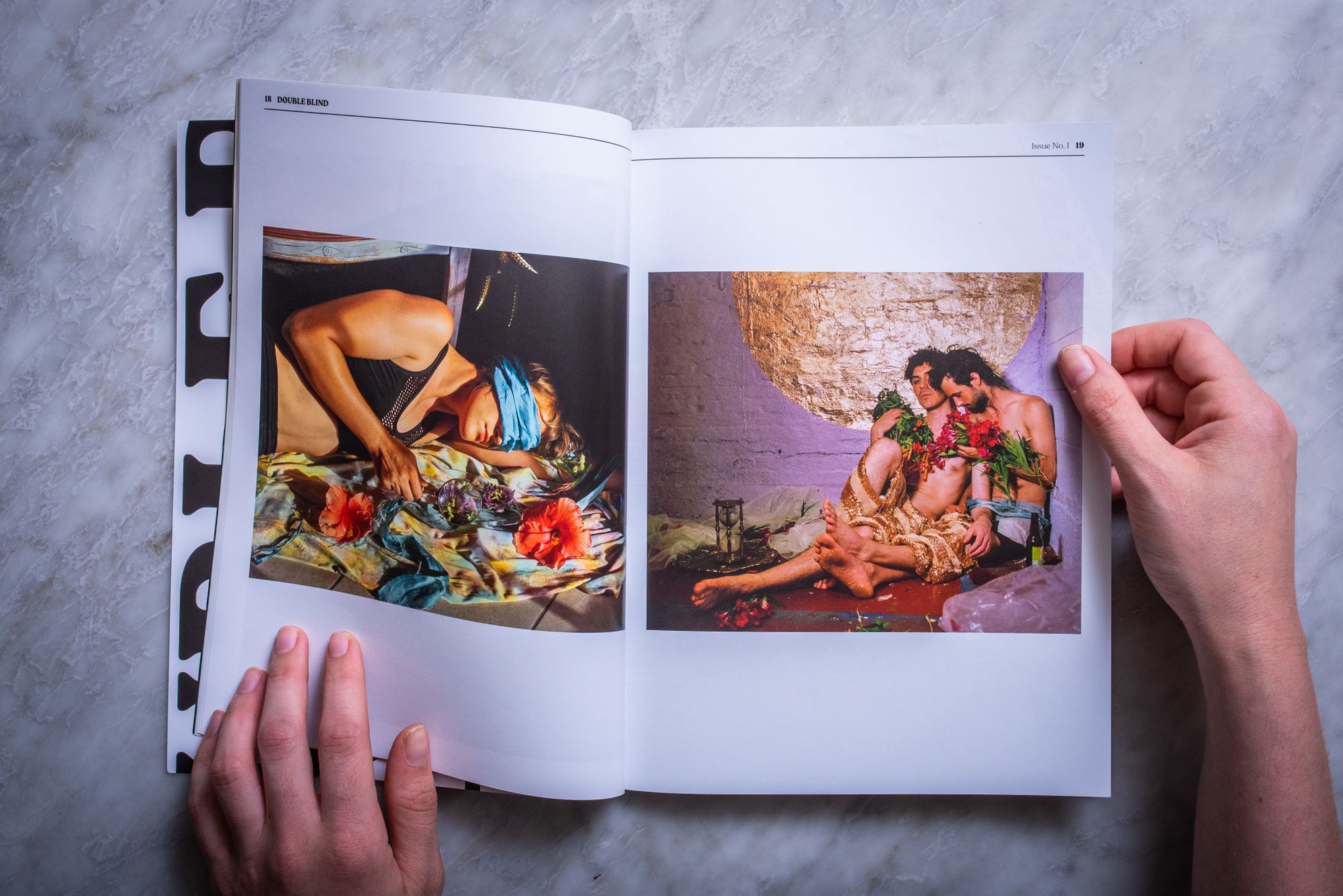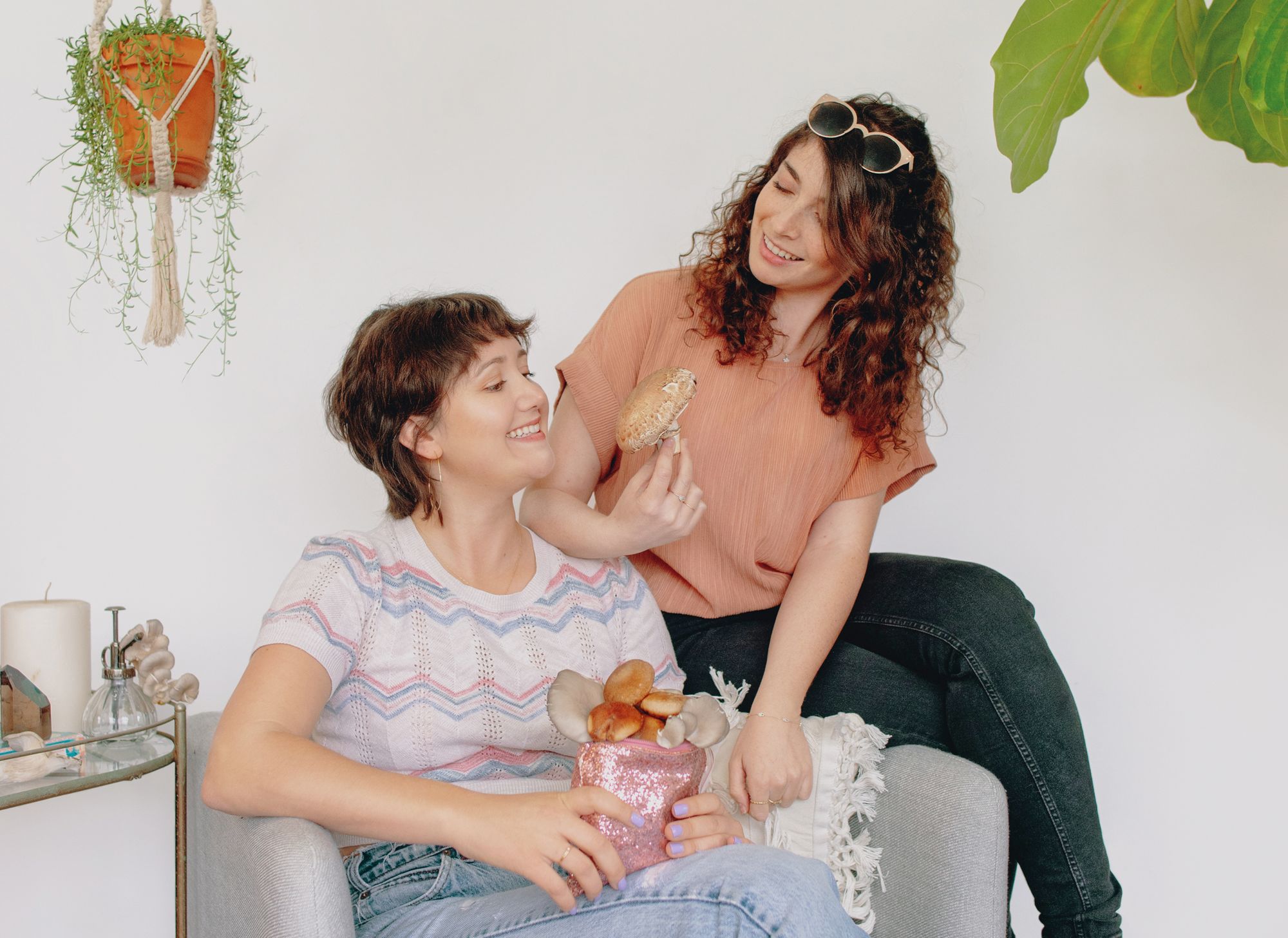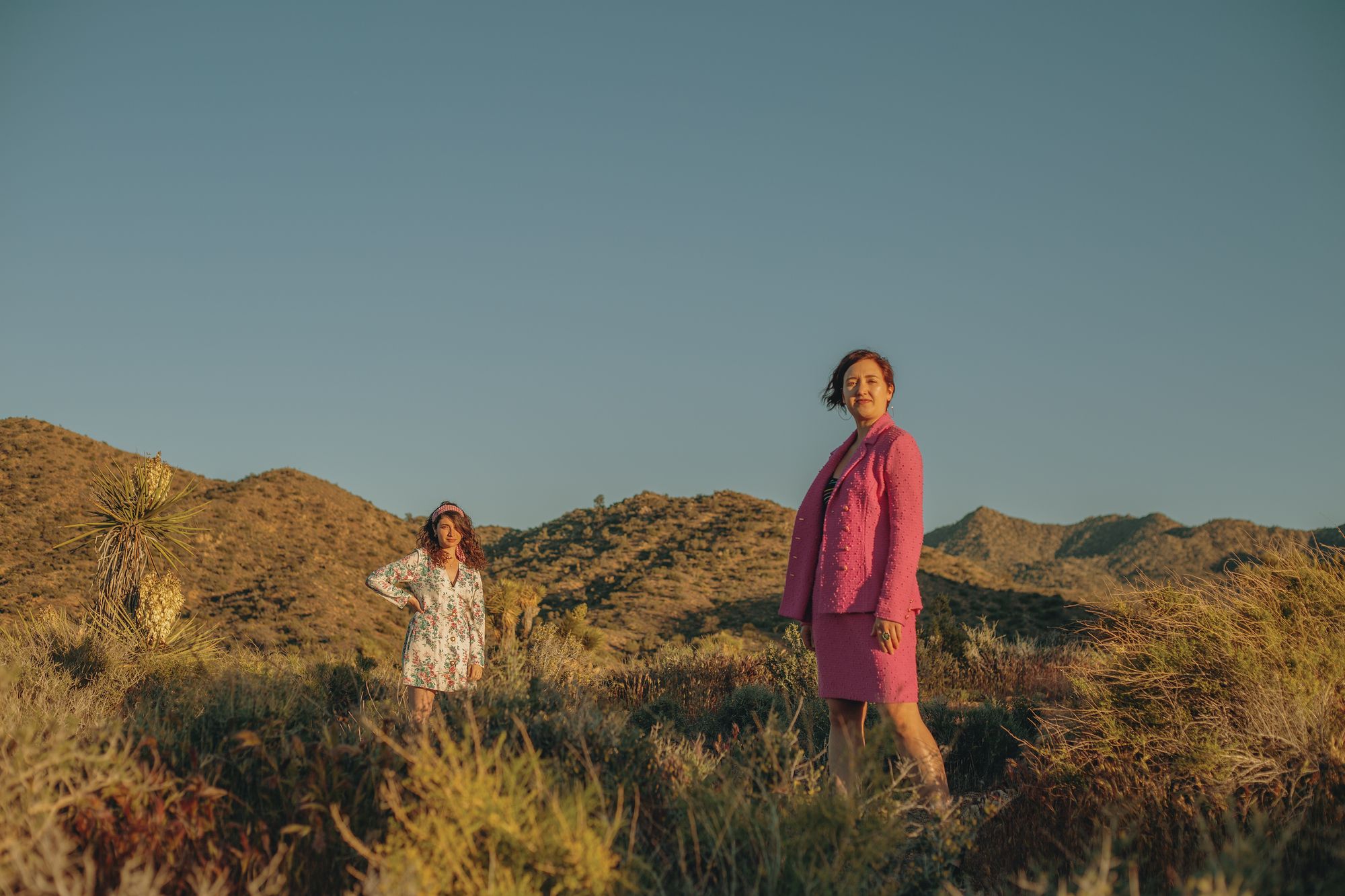The psychedelic revolution is taking place across the globe, with DoubleBlind at the forefront to capture its every transformation of medicine, business, and culture. Featuring stories from contributors based around the world, the media company and education platform covers some of the most important issues of our time, from the depression epidemic and corporatization of medicine, to a longing for communal spirituality. DoubleBlind’s fifth edition dives deep into what it means to live psychedelically, exploring the future of MDMA godfather Sasha Shugin’s legacy, the iconography of Mexican curandera Maria Sabrina, the medicine-versus-medication debate, and more.
Behind the critically important reportage and visually stunning design are DoubleBlind co-founders Shelby Hartman and Madison Margolin, whose years of experience in investigative journalism and broadcast news empower them to make the company a distinctive source for cultural enlightenment. The pair gave Honeysuckle the scoop on DoubleBlind 05, how psychedelics allow them to operate a business with integrity, and why their publication is required reading for psychenauts and the psyche-curious alike.

HONEYSUCKLE MAGAZINE: Issue 05 is out! Tell us all about it.
Shelby Hartman: DoubleBlind Issue 05 dives deep into what it means to live psychedelically—it provokes questions we may ask ourselves of who we are and how we move through the world when we are in our deepest moments of clarity.
Madison Margolin: The pandemic has been a psychedelic trip unto itself, and as we turn a new leaf into the next phase of life and the next chapter in history, we're asking ourselves individually and as a community what our values are, what kind of world we want to create. That's what we explore in this issue, diving into questions of spiritual crisis, psychedelics as medicine versus medication, the legacy of psychedelic forefathers like Sasha Shulgin and what we can expect for the future of these tools—both in terms of scientific advancements, and what they mean to our culture at large. We invite you to explore these questions and more, along with us.
What led you to start DoubleBlind?
Shelby: I actually had the idea to start DoubleBlind when I was meditating. The idea came to me spontaneously. It made sense for Madison and I, though, given our trajectories. We both care deeply about the potential of psychedelics to heal, and have been reporting on them for a number of outlets such as Rolling Stone, VICE, and LA Weekly.
Madison: I have always been passionate about psychedelics, cannabis, and where they overlap with spirituality. When Shelby came to me with the idea for DoubleBlind, it seemed obvious to pursue it with her, given that I had already been reporting on the topic already.

Is there something that DoubleBlind does that is different from other media businesses?
Shelby: I don’t think there is another company that is exactly like DoubleBlind. Madison and I met at Columbia Journalism School and are both passionate about long-form, narrative magazine writing as well as hard-hitting investigative reporting. Our inspirations for the magazine were aesthetically, California Sunday and journalistically, The Atlantic. But there’s also a unique component to DoubleBlind which is about education and harm reduction. We offer courses and webinars in the hopes of helping people safely embark on a journey with plant medicines, should they feel called to do that.
In your opinion, can psychedelics help change the way media businesses operate? How so?
Shelby: Absolutely! To be even broader than that, we’d say psychedelics can help change the way businesses, in general, operate. That was the theme of our previous magazine, Issue 4. In it, we explore how “psychedelic values,” i.e. the values that we often come to while under the influence of a psychedelic (unity, compassion) can inform how we operate in the world. In practicality, it’s a complicated question given how complicated it is to run a business, let alone a sustainable media business, in 2021. But we think entities like benefit corporations, committing a percentage of your proceeds to nonprofits, and highlighting the voices of historically marginalized communities are all good places to start.
Madison: There’s this whole discourse currently about the “mainstreaming of psychedelics” and I always say that I think rather than make psychedelics more palatable for the mainstream, to make the mainstream a little bit more psychedelic—and what I mean by that is to apply psychedelic ethos to the way business operates, and our approach to profit and/or capitalism. In psychedelic science, scientists have identified various criteria that comprise the “mystical experience” — and among those criteria is the notion of “oneness” — and so I think central to any business model (in the psychedelic space, simply psychedelically inspired, or otherwise) should be an effort to bring down the barriers between those who have access to something (like a product, or healing) and those who don’t; those who are able to participate in a market and those who aren’t. A business model that looks outward at its contribution to society, through the lens of sacred reciprocity and tikkun olam (repair the world) is what we strive toward, and what we hope to inspire within others who may connect to psychedelic morals and want to put them into daily practice.
From a business perspective, do you think psychedelics can help address social inequities? If so, thoughts on how?
Shelby: Definitely. Psychedelics are not a panacea—they will not solve all of humanity’s problems. But we’ve seen from the data in rigorous clinical trials that when people begin to heal themselves, they also begin to heal their relationships with others. We believe there’s an intimate relationship between individual, collective, and, ultimately, planetary health.
For your business, what does it mean to operate ethically and with integrity?
Shelby: Firstly, it’s about how we treat each other at DoubleBlind, the people who work for the company. We have a culture of respect, transparency, and love among all the people on the team, and we feel so blessed. Secondly, it’s about how we treat our readers. We say all the time that we never want anyone to not be able to access the resources they need to heal because of their financial situation. That’s why we offer scholarships for all of our courses and our webinars have a pay-what-you-can model. Thirdly, we think inclusivity is incredibly important, especially in the context of plant medicines that have long been preserved by indigenous communities. We have a sacred reciprocity fund, where 100% of the donations go to indigenous communities, on the checkout page of our store. We also have a BIPOC writer’s fund and have committed a percentage of our editorial budget to BIPOC writers and artists every month.

Who do you admire in the psychedelic space? What do you admire about them?
Shelby: So many! Ismail Ali and Natalie Ginsberg at MAPS are both doing incredible work helping advocate for more just drug policies, and raising awareness about the need for greater systemic change for all communities impacted by the War on Drugs alongside psychedelic reform. Bett Williams is a writer who muses eloquently on psychedelic culture and ceremony in her new book The Wild Kindness, reminding us of the importance of actually doing psychedelics (aka “the work” ourselves). We also love Sitaramaya Sita, a visionary art curator and founder of nonprofit PlantTeachers.
Madison: Wow, there are so many people in this space who I admire. The team at MAPS—Natalie, Izzy, Rick—a number of lawyers including the ladies at Plant Medicine Law, Ariel Clark and Nicole Howell, so many writers who I get to work with, a number of people taking on spirituality AND psychedelics, those in the medical space (Julie Holland, Juliana Mulligan, Andrew Tatarsky, the folks at Imperial College London, NYU, UCLA, Johns Hopkins, etc), and the many many activists who are taking the end of prohibition into their own hands.
What do you do on a regular basis to take care of your mental health?
Shelby: My mornings are sacred. I meditate every morning, read a chapter of Deepak Chopra’s The Seven Spiritual Laws of Success, and drink all my adaptogens (reishi, lion’s mane, etc.) in a cup of green tea on my porch. Madison and I are both Jewish and unplugging for Shabbat is also important to us.
Madison: I keep Shabbat in my own way. I will not take work meetings or phone calls for those 25 hours, I abstain from email, social media, and generally any screen time whatsoever (except maybe a movie, once in a blue moon). I also try to observe the Jewish calendar more holistically, taking cues from the holidays and themes of the lunar months, what the set and setting is for that time, and diving into the spiritual meaning and depths of “time.” I also do yoga, jog, stretch, and take a whole host of vitamins to boost my immunity and physical heartiness, drink cacao, do rapé here and there, and make sure to maintain healthy relationships with loved ones. I also love to be around live musical jams (though I’m not a musician myself). And I journal regularly.
Advice for other women that want to get involved in psychedelic medicine?
Shelby: Some people trip once and then never do psychedelics again. But, in a lot of cases, a journey with psychedelics and plant medicines is a journey that lasts a lifetime. Psychedelics are not right for everyone, and they won’t solve all your problems overnight. But they are one, potentially, very powerful tool for beginning to align with your deepest, truest self. So I’d say approach them with reverence, make sure you’re ready, do your research, and have a support system in place, whether that’s a psychedelic community or an integration therapist.
Favorite books (or resources) to learn about psychedelic medicine and/or business, if any?
Shelby: A good place to start is How to Change Your Mind by Michael Pollan or A Really Good Day by Ayelet Waldman. We love Your Psilocybin Mushroom Companion by Michelle Janikian for people looking to go deeper with shrooms. DoubleBlind has tons of resources, too, including a course which walks folks through every stage of the trip, from choosing the right psychedelic for you to preparing for, navigating, and integrating the experience. A good way to start learning about the psychedelic industry if you’re interested in getting into it is by attending psychedelic conferences like Breaking Convention and Horizons.
Madison: Some of my favorite psychedelic books include The Doors of Perception, Acid Dreams, Magic of the Ordinary (more about shamanism, but okay), and of course Be Here Now.

--
DOUBLEBLIND 05 is now available. For more information, and crucial education on the psychedelic movement, visit doubleblindmag.com or follow on Instagram at @doubleblindmag.
Featured photo: Shelby Hartman, left, and Madison Margolin, right. (C) Georgia Love.


